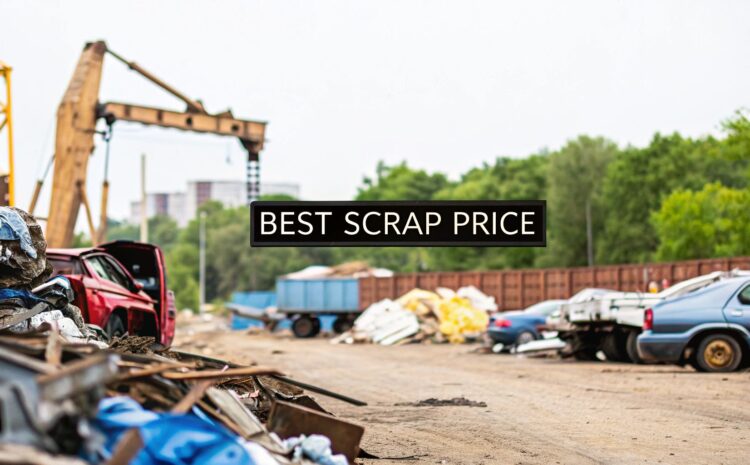
Get the Best Price for a Scrap Car in London | Expert Guide
So, you're looking for the best price for a scrap car in London? It's a common question, but the answer isn't a simple one. The truth is, scrap car values aren't set in stone; they move up and down every single day, influenced by a handful of really important factors. While you can get a general idea, your final quote will come down to your car's specific weight, its make and model, and even what’s happening in the global metals market.
Your Guide to Scrap Car Prices in London
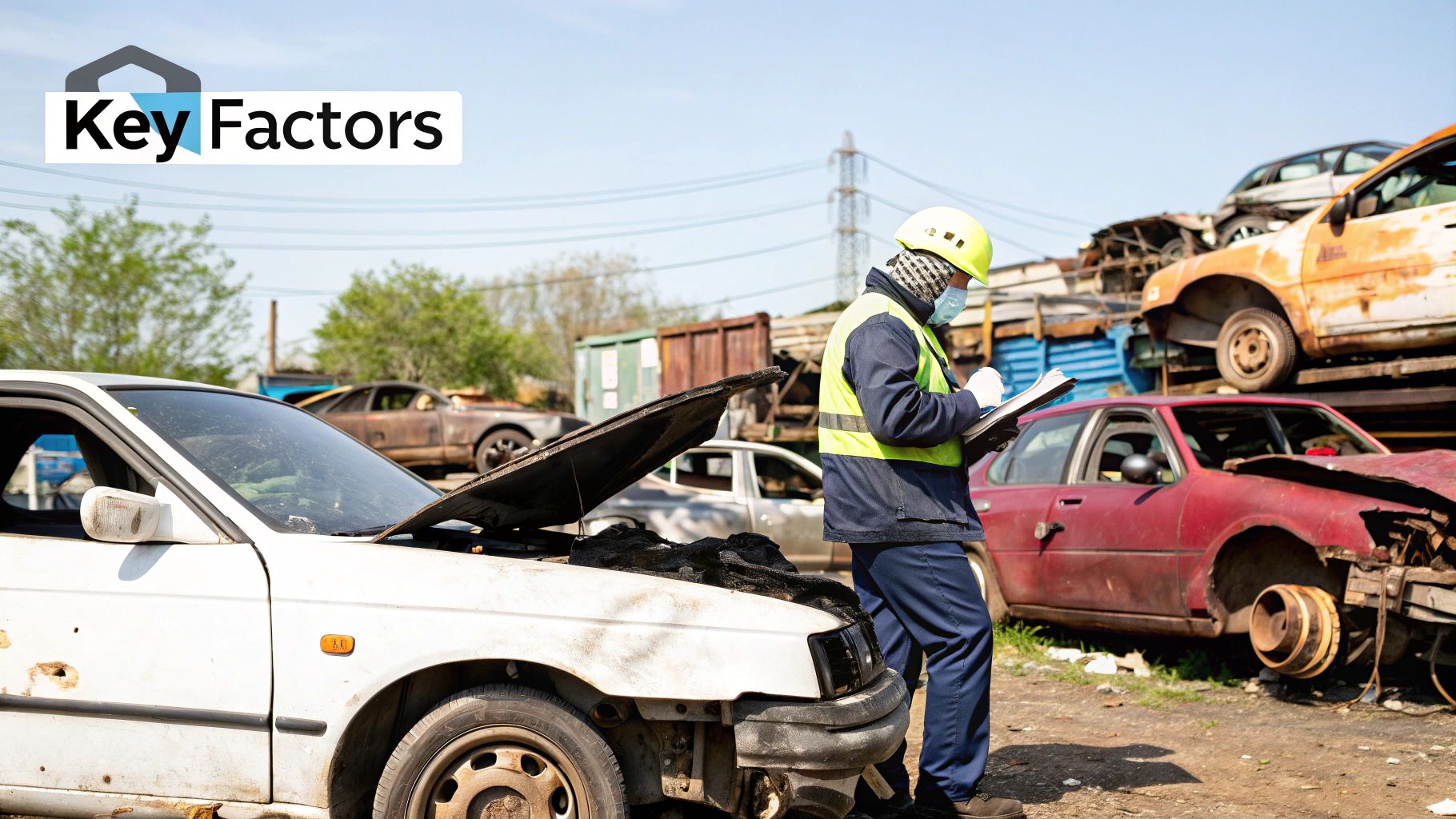
When the time comes to finally part with your old car in London, knowing what actually gives it value is the first step to getting a fair price. It helps to think of it less like selling a second-hand car and more like selling a big bundle of raw materials. The biggest piece of the puzzle is the car’s weight, because that tells the scrap yard how much recyclable metal they can recover.
But the value of that metal isn't fixed. It rises and falls with global supply and demand, a bit like the price of petrol at the pump. A boom in construction or manufacturing somewhere in the world can drive up the demand for steel, pushing scrap prices higher. On the flip side, an economic downturn can have the opposite effect, causing them to drop.
Current Price Trends in the UK
The market is always on the move, and the recent numbers show this perfectly. As of early this year, the average price for scrapping a car in the UK hovered around £226. This was a small dip from the previous month and a 3% decrease compared to late last year, when the average sat at £223, really showing just how volatile the market can be. You can dive deeper into these trends by checking out recent scrap car price updates in the UK.
This national average gives you a good baseline, but prices in London can be a little different. This is often down to local factors like higher operational costs and increased demand, partly driven by initiatives like the ULEZ scheme.
To help you get a clearer picture, let's break down the main factors that go into your scrap car quote in the capital.
Core Factors That Determine Your Scrap Car Price
This table provides a quick look at the primary elements that determine the final value of a scrap car in London.
| Factor | Impact on Price | Example |
|---|---|---|
| Vehicle Weight | High | The heavier the car, the more scrap metal it contains, which is the primary source of its value. |
| Make & Model | Medium | Some models have more valuable parts or higher-quality metals, slightly increasing the quote. |
| Global Metal Prices | High | The daily commodity market for steel, aluminium, and copper directly sets the baseline price. |
| Location (London) | Medium | Higher operational costs in London can influence quotes, but higher demand can sometimes balance this out. |
| Condition of Parts | Low to Medium | If key components like the engine, gearbox, or catalytic converter are intact, they can be salvaged for resale, adding value. |
Understanding these core components is the key to navigating the scrap process confidently in London.
The most important takeaway is that knowledge is power. By understanding the core elements that make up your quote, you can approach the process with confidence and ensure you receive the best possible price for your scrap car.
These are the main building blocks that any reputable dealer in London, including Fast Scrap Car, will use to put together your quote. They're the foundation of any fair, transparent, and honest offer.
How Scrap Car Prices Are Really Calculated
Ever wondered what goes on behind the scenes when a scrap yard in London gives you an offer for your old car? It’s not just a random number they pluck from the air. Think of it like taking apart a complex piece of machinery to sell its raw materials – that's pretty much the core of the process. The price for a scrap car is a direct reflection of its tangible assets, mainly its weight and the current market value of metal.
The whole calculation kicks off with your car's kerb weight. This is simply the weight of the vehicle on its own, without any people or luggage inside. For an Authorised Treatment Facility (ATF), this figure is the starting block because it tells them how much recyclable metal they can expect to get from your car. Simply put, a heavier car usually means more metal, which translates to a better price.
The Core Components of Your Quote
When it comes down to it, two things have the biggest impact on your quote: the car's weight and the day-to-day price of scrap metal per tonne. Your vehicle is a treasure trove of different materials. You've got the steel in the bodywork and chassis, lighter aluminium in engine components, and even valuable copper woven through the wiring system. Each of these metals has its own market price, and they all add up to form your final offer.
This breakdown shows you exactly how those elements combine to create your quote.
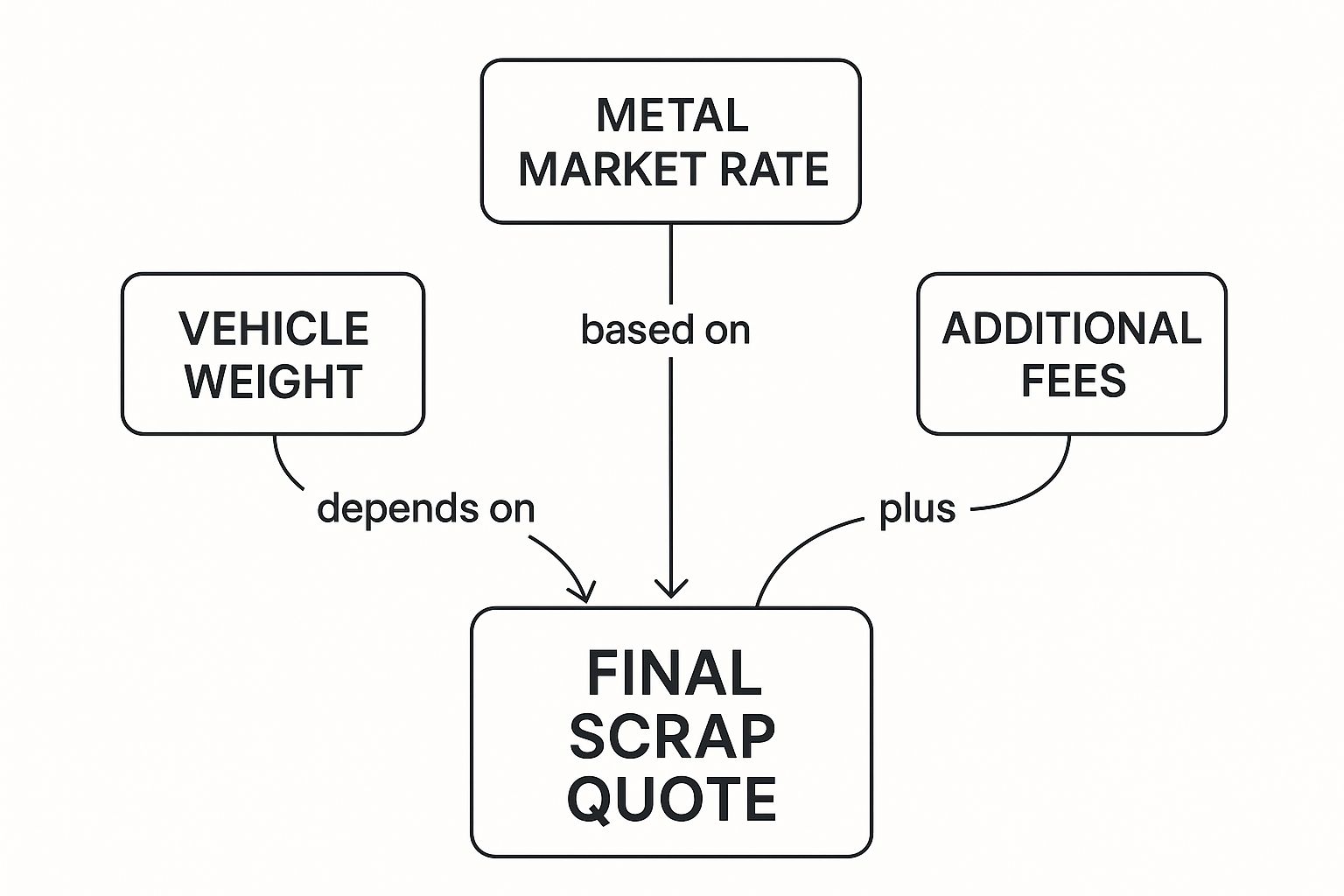
As you can see, the value comes from that blend of your car's weight and the fluctuating metal market, with any service fees deducted at the end.
Putting It into Practice
So, what does this actually mean in pounds and pence for a Londoner? Scrap car prices across the UK are determined primarily by the vehicle's weight and the constantly shifting prices of metals like steel and aluminium.
As a rough guide, scrap yards have recently been valuing metal at around £60 to £80 per tonne. Let's take a common car like a Ford Focus, which weighs about 1.3 tonnes. Based on weight alone, that gives you a baseline value somewhere between £78 and £104. The final price is often higher, though, thanks to other valuable alloys and parts.
If you want to dive deeper into how your specific car's make and model affects its value, you can explore detailed insights on what your scrap car is worth.
An Authorised Treatment Facility (ATF) follows a standardised method. This ensures the baseline value of your car is based on tangible assets, not guesswork. It's a transparent process rooted in the real-world value of commodities.
This systematic approach creates a fair and consistent starting point for every car. While other factors, like salvageable parts, can certainly nudge the price up, the foundation of every quote you receive will always be the raw weight of the metal. It’s the bedrock of the entire scrap valuation process.
Right, let's get into what really drives the price of your scrap car up or down in London.
While the sheer weight of your car and the day-to-day metal market prices set a starting point, several other things can seriously bump up your final offer. It's well worth getting your head around these, as it explains why two cars that look pretty similar on a driveway in Ealing can end up with wildly different valuations.
Think of the basic weight-based price as the floor. The factors we're about to cover are what can build a much higher ceiling on your quote.
The most obvious factor is the car's make and model. A hefty 4×4, say a Land Rover Discovery, is packed with far more steel and other metals than a tiny Fiat 500. Just on raw materials alone, the Land Rover is always going to have a higher starting value because there's simply more of it to recycle. The car's age can also play a part; newer cars often use more aluminium, which has its own value and can shift the price.
Moving from Scrap Value to Salvage Value
This is where you can see a real jump in what your car is worth. It's crucial to understand the difference between scrap value and salvage value.
- Scrap Value: This is the price for the raw metals in your car once it’s been stripped and all the fluids have been safely removed. It’s the baseline price, based purely on weight.
- Salvage Value: This is for cars that, although they're being scrapped, still have perfectly good working parts that can be taken out and sold on.
Even if your car won't start, it might have a great engine, gearbox, or alternator. There's a constant demand for these kinds of used parts to help repair other vehicles across London. A good Authorised Treatment Facility (ATF) knows how to spot these valuable components and will give you a price that reflects not just the metal, but the resale potential of those parts too.
The real chance to get a better quote comes from the condition of your car's individual parts. A flat battery doesn't make the engine worthless, and a dented wing has no impact on a perfectly good gearbox.
The Catalytic Converter Factor
One of the most valuable single items on any car heading for the scrap yard is the catalytic converter. These little boxes are full of precious metals like platinum, palladium, and rhodium, which are worth a small fortune on the global market.
The amount of these metals can vary massively from one car model to another. Hybrid cars, for example, often have catalytic converters richer in these metals, making them especially valuable. If your "cat" is still there and it's the original one that came with the car, it can add a hefty sum to your final price – sometimes over £100, depending on the car and current market rates.
By understanding these details, you're in a much better position to judge your car's potential value. Before you even ask for a quote, have a quick think about what working parts might still be on your car. This knowledge gives you the power to properly understand the offer you receive and make sure it reflects the true total worth of your car, not just its weight in metal.
How London's ULEZ Affects Your Scrap Price
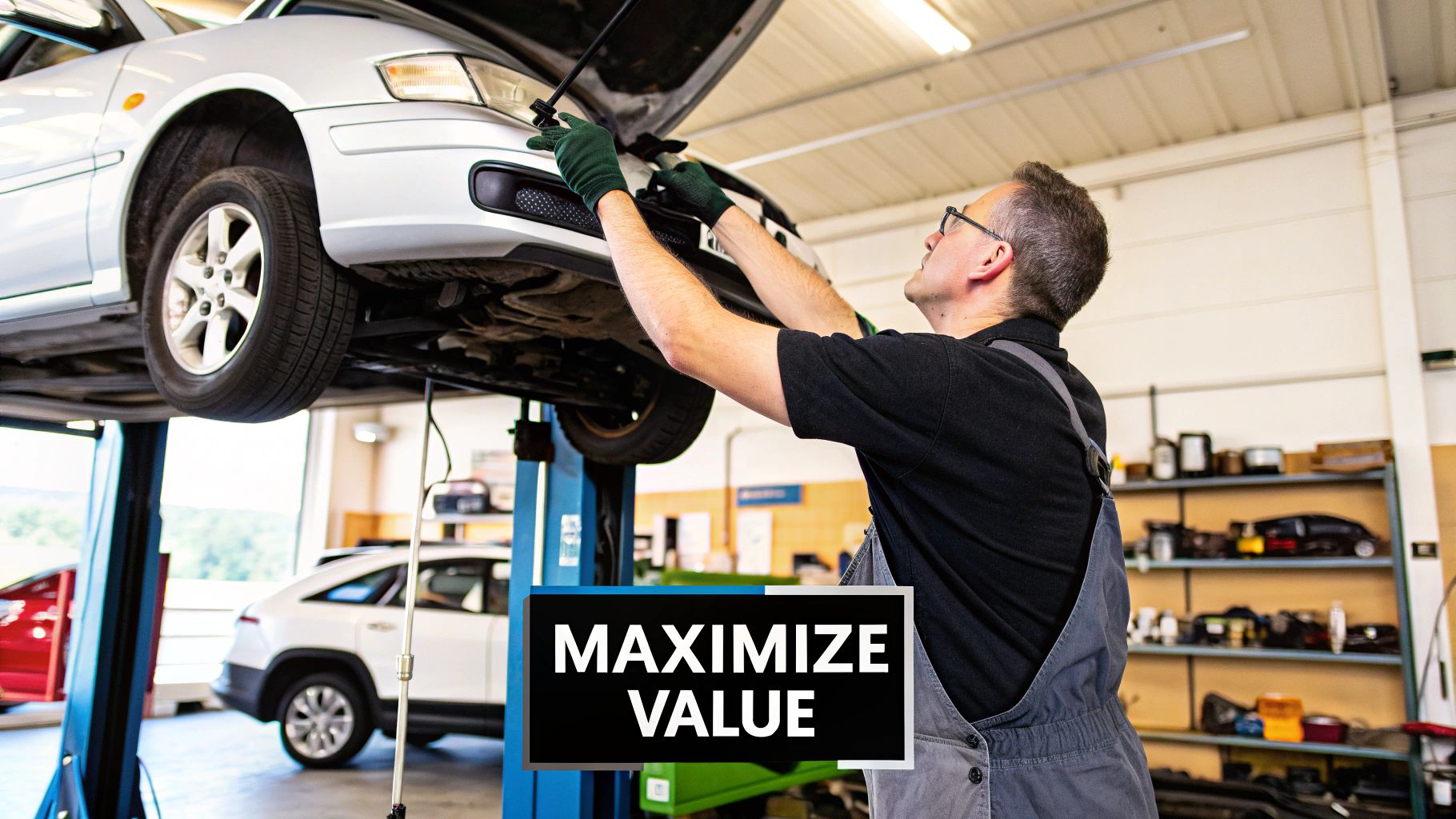
If you live in London, you're dealing with a factor that doesn't exist anywhere else in the UK when it comes to scrapping your car: the Ultra Low Emission Zone (ULEZ). This single regulation has a huge knock-on effect on the price for a scrap car, creating a completely unique market for older vehicles in the capital.
The ULEZ rules are simple but strict. Many older petrol and diesel cars now face a daily charge just for being driven within its boundaries. For many Londoners, the cost of keeping that older car on the road has become completely impractical. This has led to a massive surge in people looking to scrap their non-compliant vehicles, flooding the local market with supply and influencing what Authorised Treatment Facilities (ATFs) are willing to pay.
This unique situation creates both challenges and opportunities if you're trying to get the best scrap value in the city.
Scrappage Schemes vs Private Dealers
To soften the blow and encourage the switch to cleaner transport, Transport for London (TfL) has rolled out scrappage schemes from time to time. These government-backed programmes offer a fixed sum of money to owners who scrap a ULEZ non-compliant car. On the surface, it sounds like a fantastic deal, but it's crucial to weigh it up against what a private scrap dealer might offer.
The big question to ask yourself is this: Is the official scheme’s payment genuinely more than your car's scrap or salvage value? A private dealer might see more value in it, especially if it has desirable parts, even if it fails the ULEZ test.
Let's break down the two main paths you can take:
- TfL Scrappage Scheme: You get a set, predictable payment. It's an official route, but be prepared for strict eligibility rules for both you and your vehicle.
- Private Scrap Dealer: Their offer is based on the real-world value of your car—its weight, make, model, and any parts that can be salvaged. This can often lead to a better price, and the process is usually much quicker with less paperwork.
To get a clearer picture of how these initiatives operate, you can learn more about the vehicle scrappage scheme process and figure out if it's the best option for your situation.
London's Unique Logistical Challenges
It's not just the ULEZ. The simple act of scrapping a car in London brings its own set of logistical headaches that can quietly influence your final quote. Imagine a collection crew trying to recover a broken-down car from a narrow street in Islington with resident-only parking, or having to navigate the Congestion Charge zone just to reach a vehicle in the city centre.
These are real-world costs for any scrap dealer. While any good company will offer free collection, the time, fuel, and hassle involved in London collections are baked into their business costs. It’s another key reason why getting several transparent quotes from London-based specialists is so vital. It’s the only way to be sure you’re getting a fair price that accounts for the capital's unique challenges.
Why Scrap Metal Prices Fluctuate So Much
It might seem a bit odd, but the value of that old car on your drive in Hackney is tied to big economic shifts happening halfway across the globe. The scrap metal market is truly global, and its constant ebb and flow is the number one reason why a quote you get today could be quite different from one you might get next week.
A good way to think about it is like the price of strawberries at a local market. When they're in season and there’s a glut, they're cheap as chips. But if a bad harvest hits or everyone suddenly decides to make jam, the price shoots up. The market for recycled steel, aluminium, and copper from old vehicles works on the exact same principle, just on a massive, worldwide scale.
The Global Ripple Effect on Your Quote
At its core, the value of scrap metal is all about global industrial demand. When major economies are booming, they’re putting up skyscrapers, churning out new cars, and building endless electronics. All that construction and manufacturing creates a ferocious appetite for metal, and recycled materials from scrap cars are a critical ingredient in the mix. This high demand boosts the value of scrap metal, and that benefit trickles all the way down to you in the form of a better price for your car.
The flip side, of course, is that when economies slow down, construction sites fall quiet and factory output dips. Suddenly, there’s less need for all that scrap metal, and prices take a tumble. What happens to scrap car prices here in the UK is really a mirror of that wider economic picture. During a boom, demand for our recycled metal is high, and so are the prices. But in a downturn, falling industrial activity pushes them back down. You can find a deeper dive into these market forces and how they affect scrap car prices over at scrapcarprice.co.uk.
A construction surge in Asia or new manufacturing targets in Europe can genuinely mean you get a better price for your old Vauxhall in London. Your car is a small but vital piece in a giant global puzzle.
How Real-World Events Change Prices
It’s not just about slow-moving economic trends, either. Specific, real-world events can trigger sudden and dramatic price swings almost overnight.
- Supply Chain Disruptions: Things like international shipping logjams or trade disputes can make it much harder and more expensive to get new, raw metals. This often forces industries to lean more heavily on recycled scrap, causing a rapid spike in demand and prices.
- Energy Costs: Recycling metal is thirsty work—it uses a lot of energy. When electricity and gas prices soar, it costs scrap yards more to process each vehicle. This can put a squeeze on their margins and sometimes pushes down the prices they’re able to offer you.
This constant, complex dance between global supply, industrial demand, and current events is what makes the scrap market so lively. It's how abstract headlines about the world economy have a very real and direct impact on the final figure you're quoted by a dealer right here in London.
Your Action Plan for the Best Scrap Car Price in London
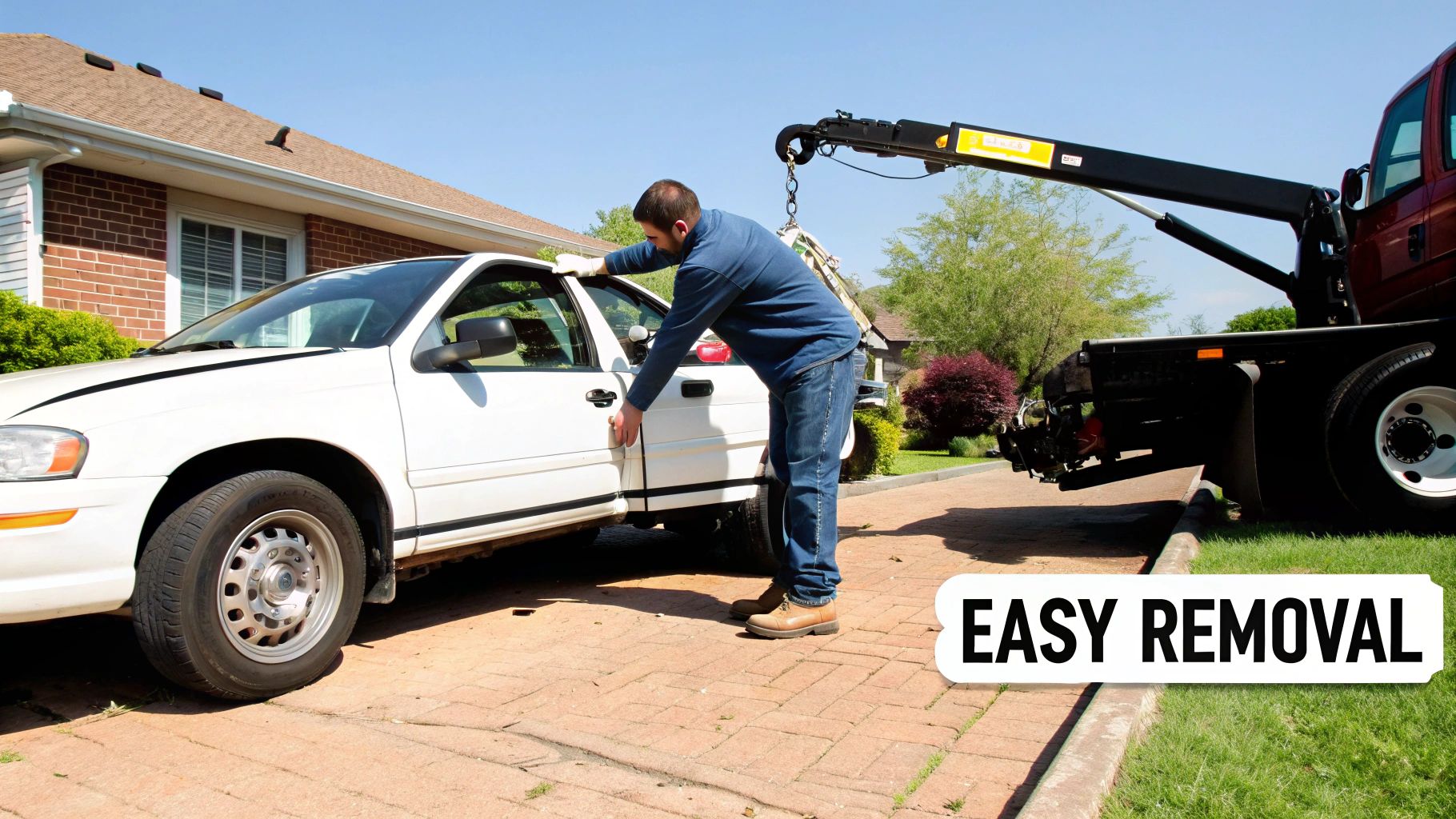
When it comes to getting the best price for a scrap car in London, a little bit of preparation goes a very long way. If you have a clear plan, you can navigate the process with confidence and make sure you’re getting a fair deal. Think of this as your practical playbook for turning that old vehicle into cash without any unnecessary hassle.
It might seem strange to 'prep' a car for the scrap heap, but it’s the same principle as selling any other item. The first step is simple but absolutely crucial: get your documents in order. Having your V5C logbook (the vehicle registration document) and a valid photo ID ready makes the whole transaction legitimate and smooth. It’s your proof of ownership, and no reputable dealer will proceed without it.
Next, it’s time to shop around. Never, ever take the first offer you get. The key is to contact several licensed Authorised Treatment Facilities (ATFs) in and around London to get a real feel for the current market rate. A few phone calls or online quote requests will let you compare offers and pinpoint the most competitive price for your car.
Your Essential Checklist
Follow these simple steps to ensure you're fully prepared and protected. This isn't just about squeezing a few extra quid out of the deal; it's about making sure the entire process is handled legally and professionally, which is especially important in a bustling market like London.
-
Gather Your Documents: First things first, find your V5C logbook and a form of photo ID, like your driving licence. This is the bedrock of a hassle-free handover.
-
Compare Multiple Quotes: Make a point of contacting at least three different ATFs. This gives you a solid benchmark for what your car is actually worth on that day.
-
Confirm Free Collection: Don't just assume the collection is included. You need to explicitly ask if there are any hidden charges for towing your vehicle, especially if it's in a tricky London spot. Good firms will always offer this service completely free.
-
Remove Personal Belongings: Do one last sweep of the glove box, boot, and under the seats. You’d be surprised what gets left behind, and once that car is on the tow truck, it's gone for good.
Avoiding Common Pitfalls
Knowing what to do is half the battle; knowing what not to do is the other half. One of the oldest tricks in the book is the "doorstep haggle." This is where a driver shows up and tries to knock the price down, suddenly blaming a scratch you already mentioned or a flat tyre.
A firm, agreed-upon price should be final. Reputable companies in London will always honour their quote, provided you've described the car accurately. Never feel pressured into accepting a lower last-minute offer.
Another classic tactic is the hidden fee. Less honest operators might try to sneak in an "admin fee" or a collection charge right at the end, deducting it from your payment. Always get confirmation that the price you are quoted is the exact amount you will receive.
For a complete rundown on maximising your car's value, check out our guide on how to scrap your car for the best value. By having a clear plan, you stay in the driver's seat and guarantee the best possible outcome.
Frequently Asked Questions from Londoners
When you're ready to say goodbye to your old car in London, a few common questions tend to pop up. Sorting out these final details can feel a bit daunting, but it doesn't have to be. Here are some straightforward answers to the queries we hear most often from people across the capital.
Do I Need My V5C Logbook?
It certainly makes life easier, but don't worry if you can't find it. You can absolutely scrap your car in London without the V5C logbook.
If your logbook has gone missing, you'll just need to prove you own the car in another way. This usually involves showing some valid photo ID, like your driving licence, and signing a form to officially declare that the vehicle belongs to you.
The scrap yard is legally obliged to tell the DVLA the car has been scrapped. That said, it's always a good idea to notify them yourself in writing. This gives you peace of mind and an official record confirming you're no longer responsible for the vehicle, protecting you from any future complications.
Is Collection Free Across All London Boroughs?
Yes, it should be. Any reputable company offering a price for a scrap car in London will include free collection as part of the deal. This should cover every corner of the city, from Croydon and Harrow right out to Barking.
The key is to double-check this when you get your quote. Some less scrupulous operators might try to sneak in a collection fee at the last minute or knock it off your final payment, especially if your car is hard to get to. Always go with a company that guarantees free collection with absolutely no hidden charges.
A quick but important legal note: you can’t be paid in cash for your scrap car. The Scrap Metal Dealers Act 2013 made cash payments illegal to help prevent metal theft.
This means all payments must be traceable. A professional company will pay you by instant bank transfer or a business cheque, and they’ll give you a proper receipt right there and then when they pick up your car. It keeps everything above board and secure for everyone involved.
Ready to get a fair and honest price for your scrap car in London? Contact Fast Scrap Car today for a transparent quote, guaranteed free collection, and instant payment. Visit us at https://fastscrapcar.co.uk to see how simple the process can be.
